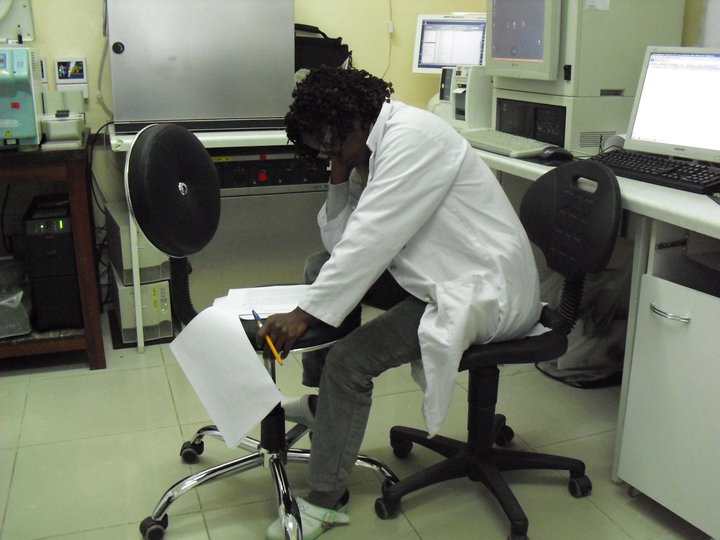JINA: MKUNDE CHACHAGE (PICHANI)
MWANAFUNZI: SHAHADA YA UZAMIVU
MFANYAKAZI: MBEYA MEDICAL RESEARCH PROGRAMME(MMRP)
TUZO:
Dr. Maria Kamm Best Woman Scientist Award
Tuzo hii inatolewa kwa mara ya kwanza mwaka huu na imeanzishwa rasmi na Dakta Mwele Malecela ambaye ni Mkurugenzi Mkuu wa NIMR. Lengo la tuzo hii kuenzi jitihaba za Mama Maria Kamm katika kuhamasisha wanawake kushiriki katika Masomo ya sayansi wanapokuwa mashuleni, jambo ambalo limesaidia kuongeza idadi ya watafiti wa Kisayansi nchini na hata NIMR.
Mama Maria Kamm alikuwa Mwalimu Mkuu maarufu wa Shule ya Sekondari wa Wasichana ya Weruweru ambaye alibobea katika miaka ya 1970, kwa umahiri wake katika kazi na kwa kuzingatia maadili halisi ya kazi ya ualimu.
Mama Kamm alikwa ni miongoni mwa walimu wachache kwa kipindi hicho waliopata Shahada ya Ualimu katika Chuo Kikuu cha Notre Dame.
Tunamuenzi Mama Maria Kamm kwa juhudi zake katika kuzalisha wanawake watafiti na viongozi katika sekta mbalimbali jambo ambalo limechangia kuinua uwezo wa wanawake katika kuongoza na kuleta maendeleo ya jamii.
UTAFITI:
Mkunde Chachage1,
Lilli Podola1,2, Petra Clowes1,2, Dickens Kowour1, Anthony Nsojo1, Inge Kroidl2,
Leonard Maboko1, Michael Hoelscher2, Elmar Saathoff2 & Christof Geldmacher2
1Mbeya Medical Research Centre, Mbeya, Tanzania; 2Department of Infectious
Diseases and Tropical Medicine, University of Munich, Munich, Germany
It has been
hypothesized that helminth infections modify HIV susceptibility and disease
progression and thus might contribute to the high prevalence of HIV-1 in
Africa. Immune system modulation by different helminth infections might
contribute to such alterations. The objective was to study immune system
modulation of different helminth infections (A. lumbricoides, Trichuris
trichiura, Hookworms, S. haematobium and S. mansoni) in relation to HIV-1
susceptibility and disease progression. Within the region of Mbeya-Tanzania, up
to 480 EMINI study participants were recruited and enrolled into the WHIS
cohort after diagnosis of helminth species by the Kato Katz method. Helminth
infected subjects received antihelmintic treatment at baseline and were
followed up at 3 months and 1 year. Immune cell subsets were studied in
peripheral blood using polychromatic flow cytometry in fresh, anticoagulated
whole blood. HIV- specific CD8 T cell responses were quantified in freshly
isolated peripheral blood mononuclear cells using an Interferon gamma (IFNg)
ELISPOT assay after stimulation with a pool of 16 HIV peptides containing
frequently recognized CD8 T cell epitopes. A total of 300 volunteers have been
enrolled to date. CD25+ FoxP3+ CD4 T cells (Tregs) were increased in subjects
infected with Ascaris and Trichuris (p<0.05). In HIV+ subjects Treg
frequencies were highest (mean 4.1%) with no apparent influence of helminth
coinfection. Interestingly, a substantial fraction of Tregs (mean 50%)
expressed the HIV co-receptor CCR5, indicating that Tregs could be a potential
cellular target for HIV infection. Neither concurrent helminth infections nor
their treatment had a significant effect on HIV-specific T cell numbers.
Antihelminthic treatment had no beneficial effect on CD4 counts. Preliminary
results do not support the hypothesis that helminth infections in general are
associated with accelerated HIV disease progression, or depressed HIV-specific
CD8 T cell responses that secrete IFNg. Regulatory CD4 T cells might be
susceptible to HIV infection due to expression of CCR5.
